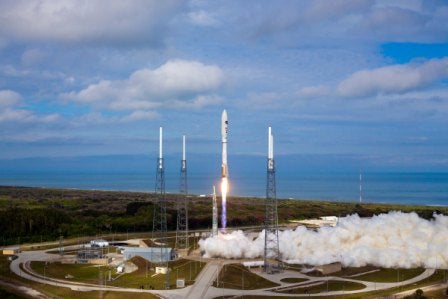
The US Air Force (USAF) has re-launched the first Boeing-built X-37B orbital test vehicle (OTV-1) into lower Earth orbit onboard an Atlas V rocket from Launch Complex 41, Cape Canaveral Air Force Station in Florida, US.
The latest launch of OTV-1, which returned to Earth in December 2010 following its first launch in April the same year, represents the next step in the air force’s initiative to enhance space capability and further develop an affordable, reusable space vehicle.
Air Force Rapid Capabilities Office (AFRCO) X-37B programme manager lieutenant colonel Tom McIntyre said the vehicle is expected to remain in orbit for approximately nine months, and will help USAF validate and understand the vehicle’s performance characteristics.
"As with previous missions, actual duration will depend on the execution of test objectives, on-orbit vehicle performance, and conditions at the landing site," McIntyre added.
As the only current space shuttle capable of returning to Earth and being reused, OTV-1 spent 224 days in orbit, while the second vehicle, OTV-2, clocked 469 days in space before making an autonomous landing at Vandenberg Air Force Base in California, US, in June 2012.
Managed by AFRCO, the X-37B programme aims to validate reusable vehicle technologies dealing with space experimentation, risk reduction and concept-of-operations development.
How well do you really know your competitors?
Access the most comprehensive Company Profiles on the market, powered by GlobalData. Save hours of research. Gain competitive edge.

Thank you!
Your download email will arrive shortly
Not ready to buy yet? Download a free sample
We are confident about the unique quality of our Company Profiles. However, we want you to make the most beneficial decision for your business, so we offer a free sample that you can download by submitting the below form
By GlobalDataTechnologies to be tested include advanced guidance, navigation and control, thermal protection systems, avionics, high-temperature structures and seals, conformal reusable insulation, lightweight electromechanical flight systems, autonomous orbital flight, as well as re-entry and landing.
Measuring 8.8m in length, the X-37B is a derivative of the Boeing X-40A space manoeuvre vehicle, and can operate at Mach 25 velocity range upon its re-entry.
Image: US Air Force’s X-37B orbital test vehicle (OTV-1) during its re-launch from Cape Canaveral Air Force Station in Florida, US. Photo: courtesy of ULA.



